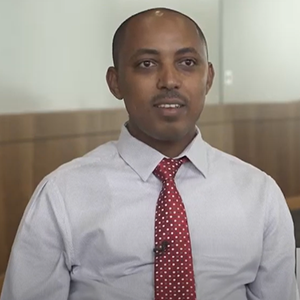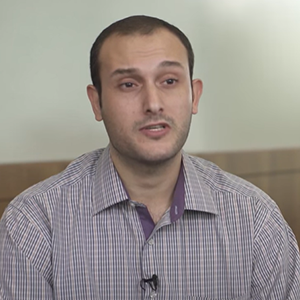International-Trained PharmD Program

Solomon Hailu, PharmD, Ethiopia
“I recommend this program to my colleagues and working pharmacists all over the world . . . It’s the best program that fits with working pharmacists because the program is given online, it’s accredited, you can keep your job, and you can have time with your family while studying this program.”

Abdullah Jibreel, PharmD, Jordan
“The program allows me to study and at the same time keep my work. This degree is accredited and will give me the chance to advance my career to a higher level. It will open the doors in front of me . . . to being a clinical pharmacist, seek a residency or specialize in one area.”
![]()
Program Format
Online courses – spring, summer and fall semesters
On-Campus Live Sessions and U.S.-based Practice Experiences
*NOTE: If you are a current student, admitted prior to spring 2024, please work with your advisor on your revised academic plan.
Key Dates
Applications are due by July 1*
New students begin in fall semester (August) each year
*We will not be accepting new applications after this application cycle.
Program Length
4 years full-time, up to 6 years part-time*
The ITPD curriculum meets the same abilities-based outcomes / Curricular Outcomes and EPAs as the school’s on-campus entry-level program, with advanced standing achieved through coursework earned in the applicant’s baccalaureate Pharmacy degree, prior professional experience, and successful of passing of four pre-admission foundational exams.The exams will assure knowledge in common foundational pharmacy baccalaureate degree coursework: Applied Biologic Chemistry, Pharmaceutics, Medicinal Chemistry and Pharmacology/Toxicology. Alternatively, applicants may demonstrate this competency through successful passing of the US Foreign Pharmacy Graduate Equivalency Exam (FPGEE). These applicants will submit an official copy of their FPGEE exam results.
Details of the Curriculum are found in the in the Program Format.
*NOTE: If you are a current student, admitted prior to spring 2024, please work with your advisor on your revised academic plan.
Curriculum Planning
The ITPD Program is primarily a distance-based program, yet the ITPD Program does require students to come to Colorado during the curriculum. During these visits, students complete program requirements through live sessions, which occur each year.
- Most live sessions consist of experiential requirements. Skills assessments related to some didactic courses occur with some. (See Program Format above)
- Most live sessions must occur in Colorado, USA
- Two international advanced pharmacy practice experiences (APPE rotations) are allowed (electives only)
- APPE rotations do not need to be completed consecutively, offering flexibility in coming to the United States for them.
All students have six years to complete the program requirements. To offer maximum flexibility, the program can be completed in a part-time or full-time format. The ITPD Program encourages students to complete, at a minimum, four to six credit hours per semester for a part-time format.
Upon admission into the ITPD Program, all students will schedule an advising call. During the advising call, every student will receive an individualized plan defining how and when the student will complete the didactic and experiential requirements. Any student can request an advising call at any time during the program.
PLEASE NOTE: Successful completion of the ITPD program’s pathway to the PharmD degree does NOT ensure eligibility for licensure in the US, as each state sets its own requirements for licensure.
*NOTE: If you are a current student, admitted prior to spring 2024, please work with your advisor on your revised academic plan.
This didactic curriculum focuses on a combination of professional skills courses (e.g. Patient-centered communication, Clinical Pharmacokinetics, Pharmacogenomics, Evidence-based Medicine & Literature Evaluation, Interprofessional Education courses, Public Health & Health Outcomes, Clinical Capstone, and others) and pharmacotherapy courses, which are the core of the didactic curriculum.
Pharmacotherapy courses address the pathophysiology, advanced pharmacotherapeutics, pharmacokinetics and professional skills development specific to the disease state. For example, the cardiovascular course includes:
- The pathophysiology of common cardiovascular disorders, such as hypertension, myocardial infarction, congestive heart failure and dysrhythmias;
- Pharmacotherapeutic management of patients with these disorders, including design of patient-specific individualized drug therapy treatment plans;
- Pharmacokinetics of drugs used to treat cardiovascular disorders;
- Basic cardiovascular physical assessment skills, such as blood pressure monitoring;
- Problem-based case discussions of patients with cardiovascular disorders;
- Other appropriate clinical skills development activities.
The ITPD experiential training curriculum begins within the didactic curriculum, where we provide 400 contact hours of introductory and advanced introductory pharmacy practice experiences (IPPEs/aIPPEs):
- 80 hours live Community IPPE experiences
- 80 hours live Health System IPPE experiences
- 240 hours live advanced IPPE experiences
Upon completion of the live and online didactic curriculum, the experiential program continues with seven, six-credit hour advanced pharmacy practice experiences (APPEs), in the following practice areas:
- 1 Community Pharmacy – Required
- 2 Health-System Pharmacy* – Required – (Includes at least one inpatient general medicine patient care APPE and one Institutional pharmacy APPE)
- 1 Ambulatory Care – Required
- Elective One
- Elective Two
- Elective Three
Elective APPE rotations may be selected from a variety of medicine subspecialties, such as neurology, oncology, nutrition, infectious diseases, critical care, psychiatry and pediatrics, or other elective rotation choices such as pharmaceutical care projects, education, administration, industry, managed care and clinical research.
All APPE rotations are six weeks in length (or 240 hours) completed on a full-time basis, totaling 42 weeks or 1680 APPE rotation hours.
ITPD students must complete all required APPE rotations in the United States (US). ITPD students do not have to complete the APPE rotations consecutively, so students have the option to come to the US for multiple shorter periods of time during the second live session. ITPD students have the opportunity to complete two (2) elective APPE rotations at an international rotation site. To be considered for this opportunity, the student will submit a request for review and approval. Students can locate more information about APPE rotations within the Current Students section.
The International-Trained PharmD (ITPD) Program is open to pharmacists who possess a bachelor degree (or equivalent) in pharmacy from any locally-approved or accredited college or university program outside of the United States. Applicants must be licensed (or local equivalent; see license requirement below) pharmacists and be in good standing with the licensing agency in their country. Successful applicants must also demonstrate a desire and commitment to expand patient-centered pharmacy care in their home country.
University policies require background checks for all students upon admission. The Admissions Committee reserves the right to consider exceptions to the admissions policies on a case-by-case basis.
Students begin the ITPD Program in the fall semester. Applications may be submitted at any time for the ITPD Program, provided the application is received prior to the application deadline of July 1. If the deadline falls on a weekend or United States holiday, then the deadline will be the next business day. Please contact the DDP Office if there are concerns about meeting the application deadline. Otherwise, applications received after the deadline will be considered for the following admissions cycle. Acceptance into the ITPD Program will be honored for one year from the start of the first semester; otherwise, the applicant will be required to reapply.
After June 3 or once all spaces have been filled, the School of Pharmacy Admissions Committee will review each applicant's admissions packet. Those applicants who will move forward in the admissions process will be contacted to complete an admissions interview.
NOTE:
- Successful completion of the ITPD program’s pathway to the PharmD degree does NOT ensure eligibility for licensure in the U.S., as each state sets its own requirements for licensure.
- As a student of the University of Colorado Skaggs School of Pharmacy and Pharmaceutical Sciences, all ITPD students are subject to all school and program policies, including the ethics and conduct code and academic advancement policies, as our entry-level PharmD students. A full list of these policies is located on the Policies and Procedures website page.
Application Materials
Tuition and Fees
New tuition rates are established each spring and normally go into effect fall semester. An outline of the current tuition and fees (US dollars) is located below in the tuition tab.
Once students have registered for classes, a bill for tuition and fees will be generated through the Bursar’s Office; students will not receive a paper bill. All tuition and fees are due within 30 days of the first day of class.
Students will not be able to register for subsequent semesters unless the bill from previous semesters has been paid in full. Once the payment is received and processed, an official statement of payment will be available online for use with taxes or for employee reimbursement programs.
Refunds - Students who drop a class within the guidelines specified below will receive an adjusted tuition bill. The drop/add date is located on the DDP academic calendar. Any refunds due will be processed automatically by the Bursar's Office.
| Drop Date | Remaining Course Load | Tuition Due | Tuition Refund |
| Before Drop Date | Zero or any course load | 0% | 100% |
| After Drop Date | Zero or any course load | 100% | 0% |
696 KB
Scholarships and Financial Aid
Scholarships sometime become available for students. A CUAnschutz email will be sent to each student's UCDenver email account to inform students of any scholarship opportunities. In addition, scholarship information may be included in the News section of the School of Pharmacy website.
Financial aid information is available from the Anschutz Medical Campus Financial Aid & Scholarships Office.

